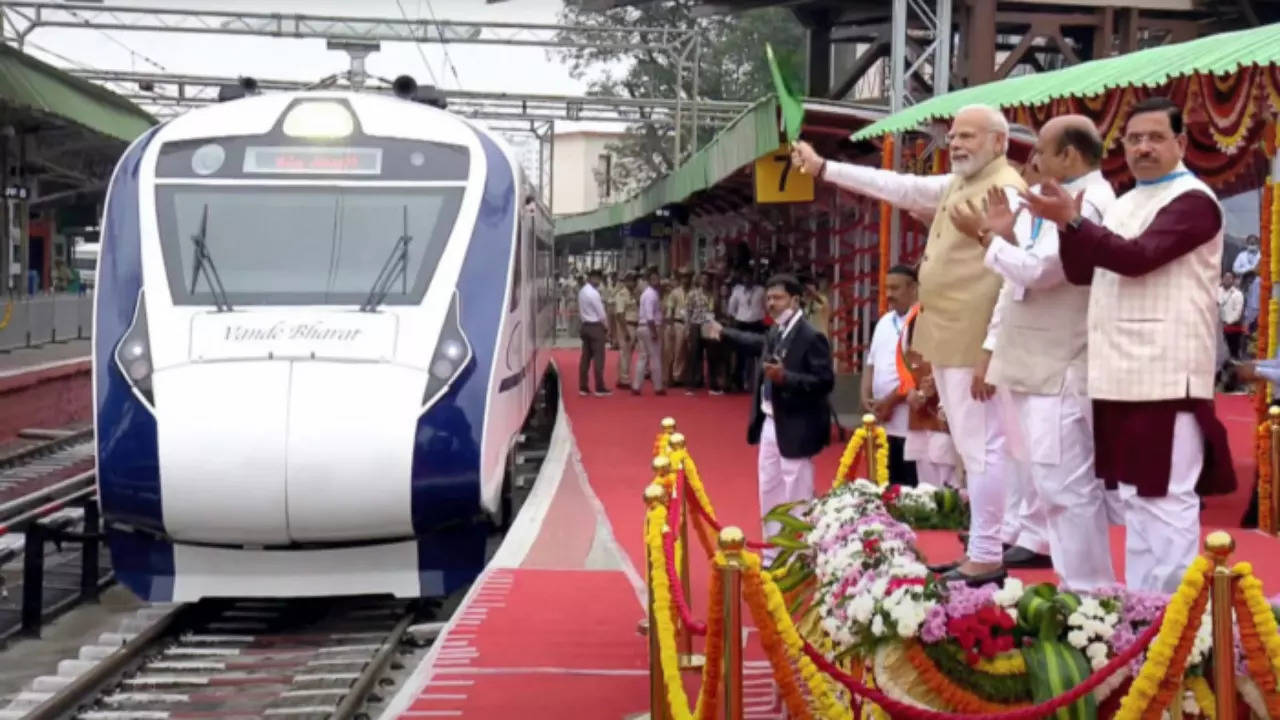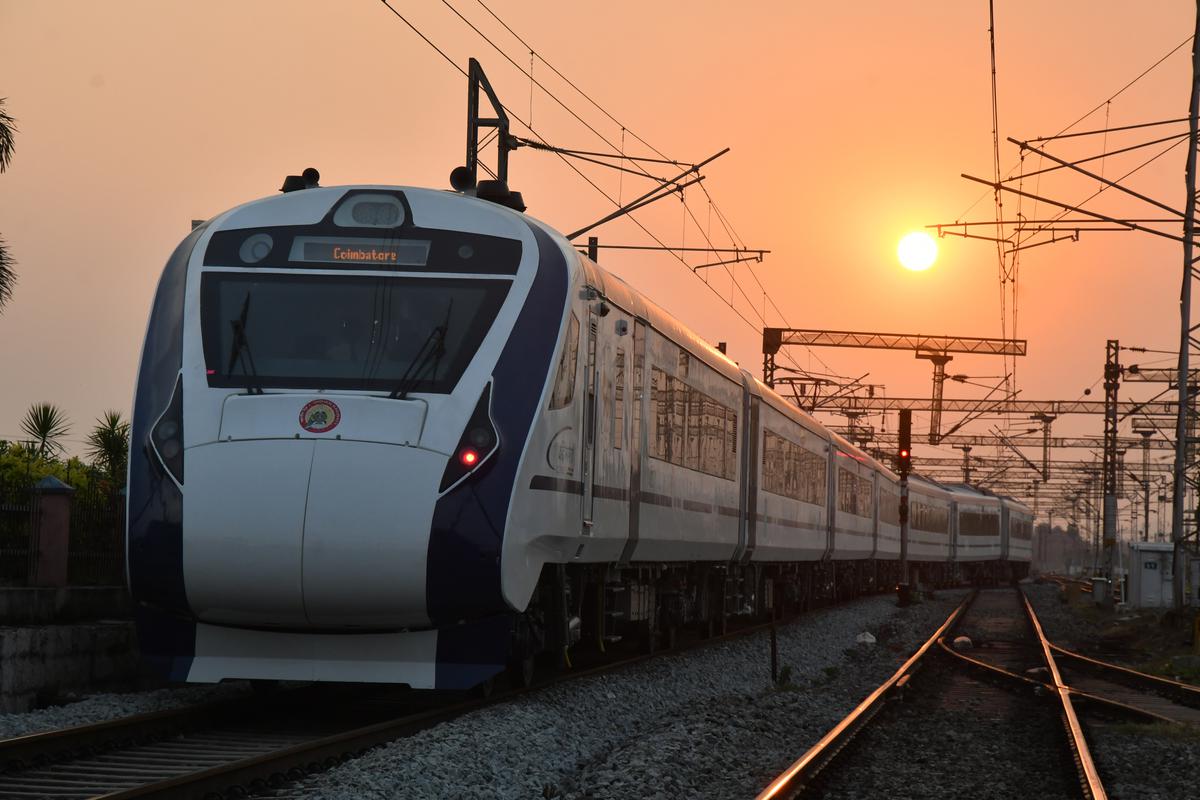Over 170 requests made by lawmakers across political parties for introduction of Vande Bharat trains

Over 170 requests made by lawmakers across political parties for introduction of Vande Bharat trains
The Indian Railway Ministry has received an overwhelming number of requests from leaders across various political parties, totaling over 170, for the introduction of Vande Bharat trains in their respective constituencies. This includes requests from leaders of the ruling Bharatiya Janata Party (BJP) as well as several major opposition leaders.
The Vande Bharat Express, also known as Train 18, is a high-speed train developed by the Integral Coach Factory (ICF) in Chennai, India. It is one of India’s fastest and most advanced trains, known for its modern amenities and superior travel experience.
Interestingly, the requests for launching Vande Bharat trains have not only come from the ruling party but also from prominent opposition leaders. Leaders such as Mallikarjun Kharge, who is the Chief of the Indian National Congress, and Chandrababu Naidu, the supremo of the Telugu Desam Party (TDP), have expressed their interest in having Vande Bharat trains introduced in their constituencies.
This significant interest from leaders across party lines highlights the acknowledgment of the Vande Bharat Express as a modern and efficient mode of transportation that can benefit various regions in the country. The requests indicate the demand for improved rail connectivity, faster travel options, and enhanced passenger amenities in different parts of India.
As the Indian government explores the possibilities of expanding the Vande Bharat Express services to various constituencies, it is likely to consider factors such as passenger demand, existing rail infrastructure, and potential economic and social benefits for the regions. The objective is to provide better connectivity and comfortable travel experiences for citizens across the country.
Railway Minister Ashwini Vaishnaw recently emphasized the remarkable popularity of Vande Bharat trains among passengers in India. He highlighted the impressive 99.60% occupancy rate for the April-June period, indicating a high demand for these modern and efficient trains during this timeframe.

The occupancy rate of nearly 100% demonstrates the significant preference and trust passengers have shown towards Vande Bharat trains. The high demand reflects the appeal of these trains, which are known for their speed, comfort, and state-of-the-art amenities. The popularity of Vande Bharat trains is a positive sign for the Indian Railways, indicating that they are meeting the needs and expectations of passengers for a seamless and enjoyable travel experience.
By achieving such high occupancy rates, Vande Bharat trains are making a notable contribution to the efforts of the Indian Railways to modernize its services and offer better connectivity to passengers across the country. As the demand for these trains continues to grow, it may encourage the government to expand their services to more routes and constituencies in the future.
The success of Vande Bharat trains has been met with enthusiasm from both ruling party leaders and opposition leaders, as evident from the numerous requests for their introduction in different constituencies. This widespread support highlights the recognition of these trains as a valuable asset in India’s transportation infrastructure, contributing to the country’s progress and development.
Railway Minister Ashwini Vaishnaw confirmed in a written reply to a question in Lok Sabha that the overall utilization of Vande Bharat trains during the current financial year 2023-24 has been an outstanding 99.60%. This high occupancy rate is a testament to the popularity and demand for Vande Bharat trains among passengers in India.
As reported in The Times of India, while a significant number of requests for Vande Bharat trains have come from lawmakers belonging to the ruling Bharatiya Janata Party (BJP), opposition parties have also shown interest in having these semi-high speed trains introduced in their constituencies.
The cross-party interest in requesting Vande Bharat trains highlights the recognition of these modern trains as an efficient and popular mode of transportation. The demand for these trains appears to transcend party lines, reflecting the acknowledgment of the value they bring to passengers in terms of speed, comfort, and convenience.

The high utilization rate of Vande Bharat trains in the current financial year is indicative of their success in meeting the travel needs and preferences of the public. The positive response from passengers and lawmakers alike may prompt further expansion of Vande Bharat train services to more routes and regions across India, contributing to improved rail connectivity and enhancing the overall travel experience for citizens.
The report indicates that the demand for Vande Bharat trains is not limited to lawmakers of the ruling Bharatiya Janata Party (BJP) but extends to various opposition parties as well. Among the opposition parties, the Aam Aadmi Party (AAP), Communist Party of India (Marxist) or CPM, and Nationalist Congress Party (NCP) lawmakers have made three requests each for the introduction of Vande Bharat trains in their respective constituencies.
Furthermore, lawmakers from the Trinamool Congress, Janata Dal (United), and Bahujan Samaj Party (BSP) have each made two requests for Vande Bharat trains. Additionally, 10 lawmakers from the Shiv Sena party and six lawmakers from the YSR Congress party have also demanded the introduction of Vande Bharat trains in their constituencies.
This cross-party interest and support for Vande Bharat trains demonstrate their appeal and effectiveness in meeting the travel needs and expectations of people from various political backgrounds and regions. The high demand from lawmakers across different parties indicates the recognition of Vande Bharat trains as a valuable asset in India’s railway infrastructure.
As more lawmakers express interest in having Vande Bharat trains in their constituencies, it reflects their desire to improve rail connectivity, offer better travel options to their constituents, and provide them with a modern and comfortable travel experience. The widespread support for Vande Bharat trains from both the ruling party and opposition parties reinforces their significance in enhancing India’s transportation network and contributing to the overall development of the country.
Congress party has made a significant number of requests, totaling 16, for the introduction of Vande Bharat trains in various constituencies. Additionally, Congress party supremo Mallikarjun Kharge has personally requested the introduction of Vande Bharat trains between Bengaluru and Mumbai.
Furthermore, TDP President Chandrababu Naidu has made a specific request for a stoppage of the Mysuru-Bangaluru-Chennai Vande Bharat train at Kuppam.
The data also reveals that 10 lawmakers from the Shiv Sena party and six lawmakers from the YSR Congress party have made requests for Vande Bharat train services in their respective constituencies.
These numerous requests from lawmakers across different parties indicate the widespread interest in and recognition of the benefits of Vande Bharat trains. The demand for these trains spans multiple regions and constituencies, reflecting the desire of lawmakers to enhance rail connectivity, improve transportation options, and provide better travel facilities for their constituents.
As the list of requests from various political parties continues to grow, it underscores the popularity and success of Vande Bharat trains in meeting the travel demands of passengers across India. The government’s focus on expanding Vande Bharat train services to more routes and constituencies is likely to further strengthen rail connectivity and contribute to India’s overall development and progress.
The Vande Bharat Express, also known as Train 18, is an electric multiple-unit train operated by the Indian Railways. It was designed and developed by the Research Designs and Standards Organisation (RDSO), and its manufacturing took place at the Integral Coach Factory (ICF) in Chennai, India.

These semi-high-speed trains were built with the capability to run at a speed of 180 kmph, making them one of the fastest trains in the country. However, for commercial operations, the speed has been capped at 130 kmph due to various factors, including track conditions, safety considerations, and the need for proper infrastructure and signaling systems to support higher speeds.
The Vande Bharat Express is well-regarded for its modern amenities, improved passenger experience, and energy-efficient design. These trains are equipped with advanced features, including automatic doors, Wi-Fi connectivity, comfortable seating, and onboard entertainment systems, providing a comfortable and enjoyable journey for passengers.
As the Indian Railways continues to develop and expand its high-speed rail network and infrastructure, there may be future opportunities to increase the operational speed of the Vande Bharat Express and other similar trains, further enhancing rail connectivity and travel options in the country.




